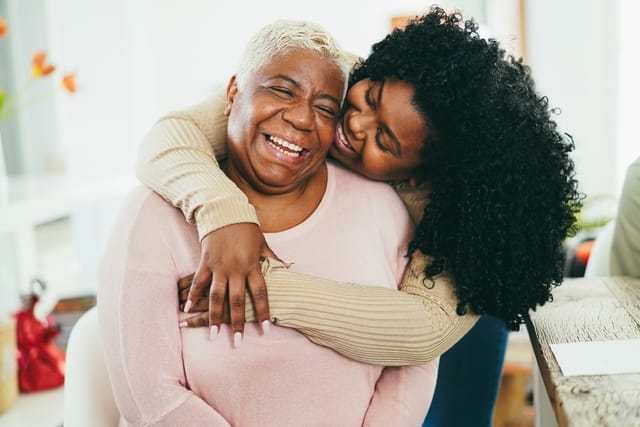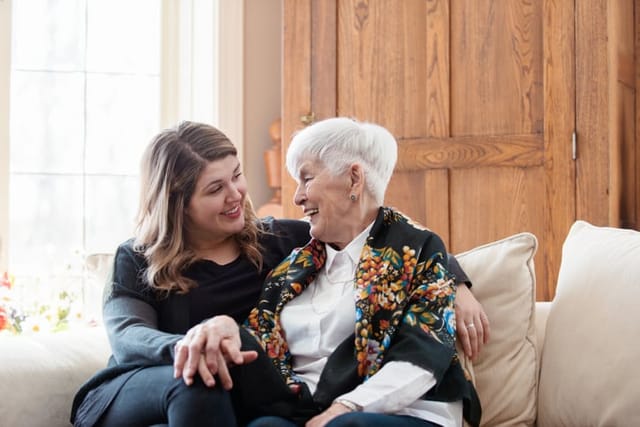Even the best parents sometimes say things they probably shouldn’t. While they mean well, certain phrases can accidentally leave a lasting mark on our confidence. While they aren’t as central to our lives in adulthood, there are some phrases that stick with us for the rest of our lives. Here are 16 things that our parents said to us that we’re still insecure about.
1. “I don’t think that’s very flattering.”

This is basically your mom saying she thinks the outfit you spent forever saving up for is ugly. Ouch! Comments like this can really hurt a teenager, especially when they’re about how you look. It can totally ruin your excitement for whatever you had planned and make you feel super self-conscious.
2. “I’ll pay for you to fix [physical imperfection].”

It’s hard to ignore the implied disgust in the fact that your parent is so put off by something in your physical appearance that they’re willing to pay to get it removed. It doesn’t exactly instruct a message that there is beauty in imperfection, does it?
3. “Are you really wearing that?”
Mean comments about clothes or style can be really damaging, especially when kids are starting to figure out who they are. Parents might see their kids growing up and making choices they don’t agree with. But those careless, hurtful words can really stick with a kid for a long time.
4. “What about something more normal?”
It’s a symptom of the generation that our parents come from: they don’t know how to embrace difference. They were taught that any deviation from the status quo was ugly or unlikeable, but times have changed. Telling your kids that something they do, think, like, wear, etc. is “abnormal” is wrong on so many levels.
5. “Don’t cut your hair off!” or “You need to cut your hair!”

Mothers love to view their daughters as extensions of themselves and live vicariously through them. When kids and young adults feel like they can’t make decisions about their own bodies, it kills their ability to explore their identity more. They’ll internalize that their body needs to be manicured, which just isn’t true. Also, claiming that something like hair is their only good physical feature is a great way to instill insecurity and self-hate.
6. “Why can’t you be more like [sibling/friend’s name]?”

These comparisons make kids feel like they’re constantly failing to live up to someone else’s standards. It hurts their self-worth and can even breed resentment towards the person they’re being compared to. Parents should celebrate their kids’ uniqueness rather than wishing they were like someone else.
7. “Dad doesn’t want you going out with that skirt.”
Sometimes, when parents know they’re about to say something hurtful, they try to get out of it by playing the “bad cop” game. Moms especially might bring up what a hypothetical “Dad” would think to make their kid change into something more conservative. This tactic is all about the parent’s own insecurities, not what’s best for the kid.
8. “You won’t get a job with that degree.”

Parents should be supportive of their children, even if they disagree with the decisions they make. By being dismissive of education or career choices, parents are implicitly telling their kids that they aren’t trusted, and this often leads to an inferiority complex. Parents should teach their kids to be strong and believe in themselves and their ability to make the right choices for their lives.
9. “When I was your age, I would never…”

This creates an impossible standard for kids to live up to. Every generation is different, and comparing a child to a parent’s past experiences is unfair, not to mention probably totally irrelevant at this point. It makes kids feel like they’re always doing something wrong and can strain the parent-child relationship.
10. “You’re just too sensitive.”

This phrase teaches kids to hide their true emotions. When a child is upset or hurt, this tells them their feelings are wrong or inconvenient. It can make them afraid to open up and will lead to them bottling up emotions instead of learning healthy ways to express themselves.
11. “Don’t be so dramatic.”

imilar to “you’re too sensitive,” this minimizes a child’s feelings. It makes them feel ashamed for having big emotions and might discourage them from showing any emotion at all. Over time, this can make it hard to feel connected with others or even understand their own feelings.
12. “Avoid emphasizing your [insert body part here].”

Pointing out flaws to your children is just teaching them how to be insecure, rather than teaching them to embrace their imperfections. This puts undue pressure on them and instructs that they should control every aspect of their appearance. This isn’t healthy, nor is it possible.
13. “It’s just a phase.”

This dismissive attitude teaches kids that their interests, feelings, and explorations don’t matter. It makes them feel like their passions aren’t important and might stop them from trying new things. Also, it reinforces the outdated idea that kids don’t know themselves or what they want in life and that their preferences should just be discarded since they’ll eventually “grow out of it.”
14. “You’d look so much prettier if you…”

Comments like these put unfair pressure on kids to change their appearance to meet someone else’s definition of beauty. It can mess with their body image and make them feel like they’re never good enough as they are. First of all, why do they need to be prettier in the first place? Second of all, the idea that they’re not beautiful just as they are is untrue and incredibly damaging.
15. “You only got that [award/good grade] because…”

This seriously undermines a child’s hard work and accomplishments. Instead of feeling proud, they’re left wondering if they actually deserve any success. It can make them doubt their own abilities and feel like they’ll never be good enough, no matter how hard they try.
16. “You need a lot more help than your sister did.”

While that’s probably not true, so what if it is? Acting as though one child’s needs being greater than another’s is a bad thing or means the needier child is in some way deficient is really unfair and incredibly harmful. The kid will grow up believing that they’re a burden and that they’re in some way lacking, neither of which are true.
Enjoy this piece? Give it a like and follow Bolde on MSN for more!






